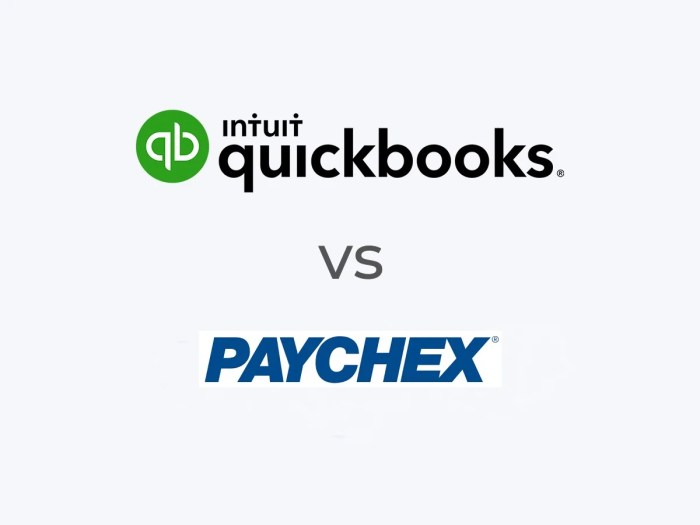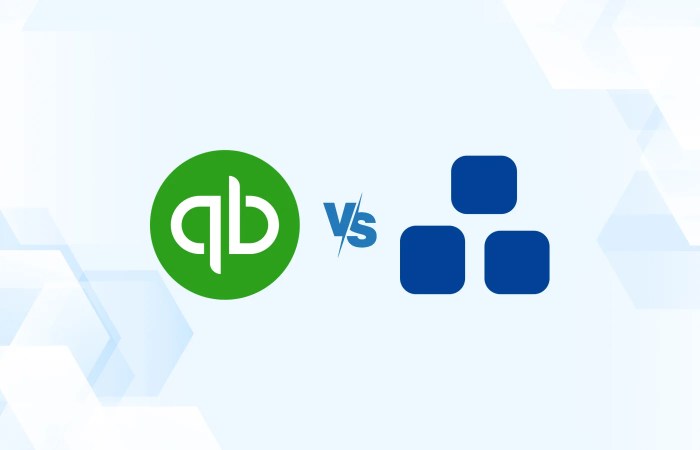
QuickBooks Payroll vs Paychex: Which is Right for Your Business?
QuickBooks Payroll vs Paychex: Choosing the right payroll software is crucial for any business, as it handles the complex and time-consuming task of paying employees accurately and on time. Both QuickBooks Payroll and Paychex are popular choices, offering a range of features and functionalities to streamline your payroll process.
This comprehensive guide will delve into the key differences between these two leading payroll solutions, helping you make an informed decision based on your specific needs and budget.
We’ll explore features, pricing, user experience, integrations, security, customer support, and more, providing you with the insights you need to determine which platform aligns best with your business goals. Whether you’re a small startup or a larger enterprise, understanding the nuances of each solution is essential for making the right choice.
Introduction

Payroll is a critical function for any business, regardless of size. Accurate and timely payroll processing ensures employees are paid correctly and on time, while also adhering to legal requirements and maintaining employee satisfaction. Payroll software plays a vital role in streamlining this process, automating tasks, and minimizing errors.
Two popular payroll software solutions are QuickBooks Payroll and Paychex. Both platforms offer a range of features designed to simplify payroll management, but they cater to different business needs and preferences.
QuickBooks Payroll and Paychex: An Overview
QuickBooks Payroll is a popular choice for small and medium-sized businesses (SMBs) that use QuickBooks accounting software. It integrates seamlessly with QuickBooks, simplifying the process of tracking expenses, income, and payroll data in one centralized system. Paychex, on the other hand, is a comprehensive payroll service provider that offers a wider range of features, including HR solutions, benefits administration, and workforce management tools.
Paychex is often preferred by larger businesses with more complex payroll needs.
Features and Functionality

QuickBooks Payroll and Paychex are both popular payroll software solutions, offering a range of features designed to simplify payroll processing, tax compliance, and employee management. However, they differ in their specific features and functionalities, catering to different business needs and sizes.
This section will delve into the key features of each platform, highlighting their strengths and weaknesses to help you make an informed decision.
Payroll Processing
Payroll processing is the core function of any payroll software, and both QuickBooks Payroll and Paychex excel in this area. They automate tasks such as calculating wages, withholding taxes, and generating paychecks.
- QuickBooks Payrolloffers a streamlined payroll processing experience, integrating seamlessly with other QuickBooks products. It supports various pay frequencies, including weekly, bi-weekly, semi-monthly, and monthly. QuickBooks Payroll also allows for easy handling of multiple pay rates, overtime, and deductions.
- Paychexis known for its robust payroll processing capabilities, handling complex payroll scenarios with ease. It supports a wide range of payroll options, including multiple pay rates, overtime, bonuses, and commissions. Paychex also provides features for managing garnishments and other payroll deductions.
Tax Filing and Compliance
Staying compliant with ever-changing tax laws is crucial for businesses. Both QuickBooks Payroll and Paychex offer comprehensive tax filing and compliance features to ensure accurate and timely tax payments.
Choosing between QuickBooks Payroll and Paychex can feel like a major decision, just like figuring out how to maximize space in a small bedroom. If you’re struggling with clutter, you might find some inspiration in these 7 tried and tested bedroom storage tips to maximize your space.
Once you’ve conquered the clutter, you can tackle your payroll needs with a clear mind, comparing features and pricing to find the best fit for your business.
- QuickBooks Payrollautomatically calculates and files federal, state, and local taxes, minimizing the risk of errors and penalties. It also provides access to tax forms and guidance, helping businesses stay informed about tax regulations.
- Paychexoffers a similar level of tax compliance support, with automated tax calculations and filings. It also provides access to a dedicated team of tax professionals who can answer questions and provide guidance on tax-related matters.
Employee Onboarding and Management
Onboarding new employees and managing existing ones efficiently is essential for any business. Both QuickBooks Payroll and Paychex provide tools to streamline these processes.
- QuickBooks Payrollsimplifies employee onboarding by providing templates for onboarding documents and forms. It also offers features for managing employee information, such as contact details, pay rates, and tax information.
- Paychexoffers a more comprehensive employee management suite, including features for onboarding, performance tracking, and benefits administration. It also provides tools for managing employee time off and attendance.
Time and Attendance Tracking
Tracking employee time and attendance accurately is crucial for payroll accuracy and compliance. Both QuickBooks Payroll and Paychex offer time and attendance tracking features.
- QuickBooks Payrollintegrates with third-party time and attendance systems, allowing businesses to track employee hours and generate accurate payroll data.
- Paychexoffers its own time and attendance tracking system, which can be accessed online or through a mobile app. This system provides features for tracking employee hours, breaks, and overtime.
Direct Deposit and Payment Options
Providing employees with convenient payment options is essential for employee satisfaction. Both QuickBooks Payroll and Paychex offer direct deposit and other payment options.
- QuickBooks Payrollsupports direct deposit, allowing businesses to deposit employee paychecks directly into their bank accounts. It also offers the option of paper checks.
- Paychexoffers a wider range of payment options, including direct deposit, paper checks, and prepaid debit cards. It also provides features for managing employee paycards and making payments to vendors and contractors.
Reporting and Analytics
Access to comprehensive reporting and analytics is essential for businesses to track payroll costs, identify trends, and make informed decisions. Both QuickBooks Payroll and Paychex provide reporting and analytics features.
Choosing between QuickBooks Payroll and Paychex can be a tough decision, especially when you’re juggling the complexities of managing a growing business. It’s all about finding the right fit for your needs, and sometimes, that means looking beyond the obvious.
For example, Stephen Poloz’s recent proposals to attract Canada’s pension managers home highlights the importance of understanding the broader economic landscape and how it impacts your payroll decisions. Ultimately, whether you opt for QuickBooks Payroll or Paychex, you need to consider the long-term implications and how it aligns with your overall business strategy.
- QuickBooks Payrolloffers a variety of reports, including payroll summaries, tax reports, and employee earnings statements. It also provides access to real-time payroll data, allowing businesses to monitor their payroll costs.
- Paychexoffers a more advanced reporting and analytics suite, with customizable reports and dashboards. It also provides features for analyzing payroll data and identifying potential areas for cost savings.
Comparison Table
| Feature | QuickBooks Payroll | Paychex |
|---|---|---|
| Payroll Processing | Streamlined processing, integrates with other QuickBooks products. | Robust processing capabilities, handles complex payroll scenarios. |
| Tax Filing and Compliance | Automated tax calculations and filings, access to tax forms and guidance. | Automated tax calculations and filings, dedicated team of tax professionals. |
| Employee Onboarding and Management | Simplified onboarding with templates, basic employee management features. | Comprehensive employee management suite, including onboarding, performance tracking, and benefits administration. |
| Time and Attendance Tracking | Integrates with third-party systems. | Offers its own time and attendance tracking system. |
| Direct Deposit and Payment Options | Direct deposit and paper checks. | Direct deposit, paper checks, prepaid debit cards, and paycard management. |
| Reporting and Analytics | Variety of reports, access to real-time payroll data. | Advanced reporting and analytics suite, customizable reports and dashboards. |
Pricing and Plans
Both QuickBooks Payroll and Paychex offer a range of pricing plans tailored to meet the needs of different businesses. These plans can be broken down based on the number of employees, the features included, and the specific requirements of your business.
QuickBooks Payroll Pricing
QuickBooks Payroll provides three primary pricing plans:
- Self-Employed:This plan is specifically designed for sole proprietors and independent contractors. It costs $15 per month and includes basic payroll features like calculating and filing taxes, generating paychecks, and tracking expenses.
- Simple Start:This plan is ideal for small businesses with up to 3 employees. It costs $45 per month and includes additional features like direct deposit, 401(k) administration, and access to payroll support.
- Essentials:This plan caters to businesses with up to 50 employees. It costs $85 per month and provides more advanced features like workers’ compensation insurance, time tracking, and payroll reports.
Additionally, QuickBooks Payroll offers a Premiumplan for larger businesses with more complex payroll needs. This plan costs $125 per month and includes features like HR support, benefits administration, and compliance guidance.
Paychex Pricing
Paychex offers a more comprehensive pricing structure, with plans tailored to different business sizes and payroll needs.
- Select:This plan is ideal for small businesses with up to 50 employees. It costs $40 per month per employee and includes basic payroll features like calculating and filing taxes, generating paychecks, and direct deposit.
- Professional:This plan caters to mid-sized businesses with up to 200 employees. It costs $55 per month per employee and includes additional features like 401(k) administration, time tracking, and access to HR support.
- Enterprise:This plan is designed for larger businesses with more complex payroll needs. It costs $70 per month per employee and provides advanced features like benefits administration, compliance guidance, and access to dedicated payroll professionals.
Paychex also offers a variety of add-on features and services that can be customized to meet the specific needs of your business. These include features like workers’ compensation insurance, PTO tracking, and payroll reporting.
Value Proposition
When comparing the value proposition of QuickBooks Payroll and Paychex, it’s important to consider the size and needs of your business.
- Small Businesses:For businesses with fewer than 50 employees, QuickBooks Payroll offers a more affordable option with its tiered pricing plans. However, Paychex’s Select plan provides a more comprehensive set of features at a competitive price point.
- Mid-Sized Businesses:For businesses with 50 to 200 employees, Paychex’s Professional plan offers a more robust set of features, including HR support and more advanced payroll capabilities. QuickBooks Payroll’s Essentials plan may be sufficient for businesses with simpler payroll needs.
- Large Businesses:For businesses with more than 200 employees, Paychex’s Enterprise plan provides a comprehensive suite of features and dedicated support, making it a suitable option for complex payroll needs. QuickBooks Payroll’s Premium plan may not be as comprehensive but offers a more affordable alternative for larger businesses.
Ultimately, the best choice for your business depends on your specific needs and budget.
User Experience and Interface
The user experience and interface are crucial aspects of any software, particularly for accounting and payroll solutions. Both QuickBooks Payroll and Paychex offer intuitive platforms, but their strengths and weaknesses vary depending on the specific needs and preferences of the user.
Ease of Use
Both QuickBooks Payroll and Paychex are designed with user-friendliness in mind. QuickBooks Payroll is generally considered more intuitive for small businesses and individuals due to its simple interface and straightforward navigation. Paychex, while powerful, can be more complex for those unfamiliar with payroll software.
Navigation
Both platforms provide clear and organized navigation menus. QuickBooks Payroll utilizes a straightforward menu system, while Paychex offers a more comprehensive dashboard with multiple tabs and sections. The ease of navigation depends on individual preferences and familiarity with the software.
Mobile Accessibility
Both QuickBooks Payroll and Paychex offer mobile apps that allow users to manage payroll tasks on the go. QuickBooks Payroll’s mobile app is widely praised for its user-friendliness and accessibility, while Paychex’s app, while functional, may require some adjustment for users accustomed to the desktop version.
Customer Support
Both platforms provide customer support options, including phone, email, and online resources. QuickBooks Payroll offers a comprehensive help center and online community forum, while Paychex provides dedicated account managers for larger businesses. The level of support and responsiveness can vary depending on the plan and the specific issue.
User Experience Comparison
| Feature | QuickBooks Payroll | Paychex |
|---|---|---|
| Ease of Use | Highly intuitive, simple interface | More complex, can be challenging for beginners |
| Navigation | Straightforward menu system | Comprehensive dashboard with multiple tabs |
| Mobile Accessibility | User-friendly and accessible mobile app | Functional mobile app, may require adjustment |
| Customer Support | Comprehensive help center, online community forum | Dedicated account managers for larger businesses |
Integration with Other Software

Both QuickBooks Payroll and Paychex offer seamless integration with other software solutions, which can be extremely valuable for businesses seeking to streamline their operations and improve efficiency. This integration allows for data synchronization and automation, reducing manual tasks and eliminating the need for duplicate data entry.
Choosing between QuickBooks Payroll and Paychex can feel like a coffee conundrum: both offer a brew, but which one hits the spot? It’s like figuring out how to get that elusive E10 account credit on your Nespresso machine – sometimes you need to do a little digging – but ultimately, it comes down to what your business needs and budget allow.
Just like with coffee, there’s a perfect payroll solution out there for every company, so don’t settle for anything less.
Accounting Software Integration
Integration with accounting software is a crucial aspect of payroll processing, as it ensures accurate financial reporting and eliminates the need for manual data entry. Both QuickBooks Payroll and Paychex excel in this area, offering seamless integration with popular accounting software programs.
- QuickBooks Payroll:Integrates directly with QuickBooks Online and QuickBooks Desktop, allowing for automatic transfer of payroll data to the accounting software. This integration simplifies financial reporting and reduces the risk of errors.
- Paychex:Offers integration with various accounting software programs, including Xero, Sage Intacct, and NetSuite. This flexibility allows businesses to choose the accounting software that best suits their needs while still enjoying the benefits of seamless payroll integration.
HR Software Integration
Integrating payroll with HR software can streamline employee management processes and provide a comprehensive view of workforce data. Both QuickBooks Payroll and Paychex offer robust integrations with popular HR solutions.
- QuickBooks Payroll:Integrates with various HR software programs, including BambooHR, Gusto, and Namely. This integration enables businesses to manage employee information, track time off, and automate payroll processes.
- Paychex:Offers comprehensive HR software solutions, including Paychex Flex, which provides a unified platform for managing payroll, time and attendance, benefits, and other HR functions. This integrated approach eliminates the need for multiple software programs and simplifies HR administration.
Time Tracking Software Integration
Accurate time tracking is essential for payroll accuracy, especially for businesses with hourly employees. Both QuickBooks Payroll and Paychex offer integrations with popular time tracking software, allowing for seamless data transfer and automated payroll calculations.
- QuickBooks Payroll:Integrates with various time tracking software programs, including Toggl Track, TimeCamp, and Timely. This integration allows businesses to track employee hours worked, calculate overtime, and ensure accurate payroll calculations.
- Paychex:Offers its own time tracking software, Paychex Flex, which integrates seamlessly with its payroll system. This integrated solution provides a comprehensive platform for managing time and attendance, streamlining payroll processes, and reducing errors.
Security and Compliance
Payroll data is extremely sensitive, containing personal and financial information about employees. This makes security and compliance crucial considerations when choosing payroll software. Both QuickBooks Payroll and Paychex have robust security features and are committed to meeting industry regulations.
Data Encryption
Data encryption is a critical security measure that protects sensitive information during transmission and storage.
- Both QuickBooks Payroll and Paychex use industry-standard encryption protocols like AES-256to protect data transmitted between your computer and their servers. This ensures that even if data is intercepted, it cannot be accessed without the proper decryption key.
- Both services also encrypt data stored on their servers, further protecting it from unauthorized access.
Access Controls
Access controls are essential for limiting access to payroll data to authorized personnel.
- QuickBooks Payroll offers role-based access controls, allowing you to assign different levels of access to different users. For example, you can restrict access to payroll information to only authorized administrators while allowing other employees to view their own pay stubs.
- Paychex also offers role-based access controls, allowing you to customize user permissions based on their roles within your organization. This ensures that only authorized personnel have access to sensitive payroll data.
Compliance with Industry Regulations
Payroll software must comply with various industry regulations to ensure the security and privacy of employee data.
- Both QuickBooks Payroll and Paychex are compliant with the Sarbanes-Oxley Act (SOX), which requires companies to maintain accurate financial records and internal controls. This means that both services have procedures in place to ensure the integrity and reliability of payroll data.
- Both services are also compliant with the Health Insurance Portability and Accountability Act (HIPAA), which protects the privacy and security of health information. This is particularly important for companies that handle employee health insurance payments.
- Additionally, both QuickBooks Payroll and Paychex comply with the General Data Protection Regulation (GDPR), which applies to the processing of personal data of individuals in the European Union. This ensures that employee data is processed in a lawful, fair, and transparent manner.
Customer Support and Resources: Quickbooks Payroll Vs Paychex
Both QuickBooks Payroll and Paychex offer a variety of customer support options to help businesses navigate their payroll needs. These options are crucial for businesses that rely on these platforms to ensure accuracy and compliance in payroll processing.
Phone Support
Phone support is a critical channel for businesses seeking immediate assistance with urgent payroll issues. Both QuickBooks Payroll and Paychex offer phone support as a primary customer support channel.
- QuickBooks Payroll: Provides phone support to customers with different plans, including self-employed individuals, small businesses, and larger enterprises. The availability and hours of phone support may vary depending on the specific plan.
- Paychex: Offers 24/7 phone support to its customers, ensuring that assistance is available whenever needed. This 24/7 availability can be crucial for businesses facing payroll emergencies or requiring immediate assistance.
Email Support
Email support provides a convenient way for businesses to communicate with customer support representatives and document their queries for future reference.
- QuickBooks Payroll: Provides email support as a secondary option for customers who prefer written communication. The response time for email support may vary depending on the complexity of the query and the volume of inquiries received.
- Paychex: Also offers email support, allowing customers to send detailed inquiries or provide supporting documentation. The response time for email support can be similar to QuickBooks Payroll, depending on the nature of the query.
Live Chat Support
Live chat support offers real-time assistance for businesses seeking quick answers to their questions.
- QuickBooks Payroll: Does not currently offer live chat support as a customer support channel. This absence of live chat may be a drawback for businesses that prefer immediate interaction with customer support representatives.
- Paychex: Offers live chat support, enabling customers to connect with representatives directly through the platform’s website. This real-time communication can be valuable for resolving urgent issues or obtaining quick clarification on specific questions.
Online Resources
Both QuickBooks Payroll and Paychex provide extensive online resources to help businesses manage their payroll needs. These resources include online help centers, knowledge bases, and frequently asked questions (FAQs).
- QuickBooks Payroll: Offers a comprehensive online help center that provides detailed information on various payroll topics, including setting up payroll, filing taxes, and managing employee information. This online resource is readily accessible and serves as a valuable self-service tool for customers.
- Paychex: Also provides a comprehensive online help center, including a knowledge base that covers a wide range of payroll-related topics. The online help center is organized and searchable, making it easy for customers to find the information they need.
Availability and Responsiveness
The availability and responsiveness of customer support are critical factors for businesses seeking timely assistance with their payroll needs.
- QuickBooks Payroll: While QuickBooks Payroll offers various support options, the availability and responsiveness of customer support can vary depending on the time of day, the specific plan, and the complexity of the query. Some users have reported delays in receiving responses through email support.
- Paychex: Offers 24/7 phone support, ensuring that assistance is available whenever needed. This 24/7 availability can be a significant advantage for businesses facing urgent payroll emergencies or requiring immediate assistance. Paychex’s live chat support also provides real-time assistance for customers seeking quick answers to their questions.
Recommendations
Choosing the right payroll software can be a significant decision for any business, regardless of size or industry. To help you make the best choice, we’ll provide recommendations based on your specific needs and requirements, considering factors such as business size, industry, budget, and desired features.
Small Businesses, Quickbooks payroll vs paychex
Small businesses, typically with fewer than 50 employees, often prioritize affordability and ease of use. QuickBooks Payroll is generally a good fit for these businesses due to its intuitive interface and affordable pricing plans. It offers a variety of features that are essential for small businesses, such as:* Payroll processing:This includes calculating wages, taxes, and deductions.
Direct deposit
This allows businesses to electronically deposit employee paychecks.
Tax filing
This helps businesses comply with federal, state, and local tax requirements.
Time tracking
This feature allows businesses to track employee hours and calculate payroll accordingly.
Reporting
This provides businesses with valuable insights into payroll costs and other key metrics.For small businesses with limited budgets, QuickBooks Payroll’s Self-Employed plan is a cost-effective option. However, businesses that need more advanced features, such as HR support or workers’ compensation, may want to consider a higher-tier plan or Paychex.
Medium-Sized Businesses
Medium-sized businesses, with 50 to 200 employees, typically require more robust features and functionalities. Both QuickBooks Payroll and Paychex offer comprehensive solutions for these businesses, but Paychex might be a better choice due to its advanced features and comprehensive support.
Paychex excels in areas like:* HR support:This includes services such as onboarding, benefits administration, and compliance support.
Workers’ compensation
This provides coverage for employees injured on the job.
401(k) administration
This helps businesses manage their retirement plans.
Time and attendance tracking
This feature allows businesses to track employee time and attendance, including overtime and PTO.
Large Businesses
Large businesses with 200+ employees often have complex payroll needs and require advanced features and scalability. Paychex is generally a better choice for large businesses due to its robust features, scalability, and comprehensive support. * Advanced reporting:This provides businesses with detailed insights into payroll costs, employee performance, and other key metrics.
Integration with other software
This allows businesses to seamlessly integrate payroll with other business applications, such as accounting and HR software.
Dedicated customer support
This provides businesses with personalized support from dedicated account managers.
Industry-Specific Needs
Certain industries, such as healthcare, construction, and manufacturing, have unique payroll requirements. Paychex often offers industry-specific solutions that cater to the specific needs of these industries. For example, Paychex offers a dedicated healthcare solution that includes features such as:* Compliance with HIPAA regulations:This ensures that businesses are compliant with federal regulations governing the protection of patient health information.
Time and attendance tracking for healthcare professionals
This allows businesses to track employee time and attendance, including overtime and PTO.
Reporting for healthcare professionals
This provides businesses with detailed insights into payroll costs, employee performance, and other key metrics.
Budget Considerations
Budget is a significant factor in choosing payroll software. QuickBooks Payroll is generally more affordable than Paychex, especially for small businesses. However, Paychex offers more comprehensive features and support, which may be worth the extra cost for larger businesses or those with complex payroll needs.
Desired Features
The features you need will depend on your specific business requirements. Both QuickBooks Payroll and Paychex offer a wide range of features, but there are some key differences to consider. For example, Paychex offers more advanced features such as HR support, workers’ compensation, and 401(k) administration.
QuickBooks Payroll, on the other hand, is more focused on core payroll processing and tax compliance.





